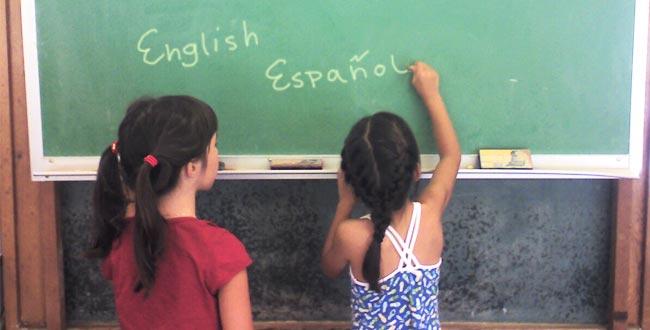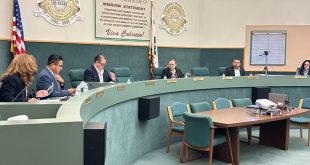
By: Adrian Ptacnik
It’s 2016, it’s election year and more than anything else, it is time to reminisce about everything that’s wrong. You have your token, “everyone agrees” topics such as the economy and unemployment. We have your “controversial” topics such as gun control, racism and climate change. And we have the ones we easily get distracted about or discuss less passionately about, like our children and their future. Sad, but true, most of us would rather save our breath to ramble about our favorite football team than the future of those who will become our future, specifically their education.
Born in California but raised in Mexico, I was fortunate to learn both English and Spanish simultaneously. Yes, I said it right, born in California and raised in Mexico, not the other way around, and not only raised but educated as well. In Mexico, particularly in border towns or cities it is quite common to find an increasingly growing array of bilingual educational offerings. Through the years, I took bilingualism for granted, assuming it was as common as learning math, until to my surprise I realized it wasn’t.
As time passes by at unprecedented speeds, the world is shrinking at the same pace. Technology has narrowed distances, demolished barriers and brought us closer or further as our own willingness allows us. Globalization is no longer a concept; it’s a reality we live day by day. Companies, big and small, are reaching wider markets than they ever dreamed of. Consumers are enjoying niche products as specific as their snobbish desires can demand. Fresh cheese from the French countryside, small batch craft beer from Germany and delicious wine from the Guadalupe Valley in Baja, anything and everything is virtually accessible. It is only a matter of time when the next commodity is talent and human resource.
In today’s world economy, the only certainty is uncertainty. Recent graduates and established professionals are constantly updating and uploading their resumes. Networking has taken a new meaning, and when in search of new and better opportunities, it’s more common than ever to wave restrictions such as the previously dreaded “willing to relocate” check box.
Talent and human resource is and will be the most common export/import. This is where bilingualism and education come back to the equation. Surely, Chinese (the sum of all of its varieties) is still the most spoken language according to experts, but English is the most common second language in the world, and Spanish holds the title for the language that is spoken in more countries as a mother tongue. By this criteria, an English-Spanish fluent bilingual speaker, is far more competitive than most.
The world, particularly the business world is hungry for well-educated, well-travelled, dedicated people to recruit and bilingual (or multilingual) individuals have the upper hand. There is scientific proof that aside from the obvious perks of speaking more than one language, “brain scans reveal a greater density of grey matter in areas of the brain associated with language processing in people who learned a second language under the age of five”. (Mechelli A., et al. Nature. Oct. 14,(2004). “Bilinguals exercise their brains automatically as they switch from one language to another. According to one study, the onset of dementia was delayed by 4 years in bilinguals compared to monolinguals with dementia.” (Paradis, J., Genesee, F., & Crago, M. (2011). Dual Language Development and Disorders: A handbook on bilingualism & second language learning.)
Additionally, being bilingual may give children an advantage at school. Bilingual children have been shown to be better than their monolingual peers at focusing on a task while tuning out distractions. This seemingly enhanced ability to concentrate has also been found in bilingual adults, especially those who became fluent in two languages at an early age. It is thought that being able to filter things out when switching language enhances the brain’s ability to focus and ignore irrelevant information. Speaking more than one language from an early age, also introduces the idea that the world is a diverse place with different languages and cultures to explore, thus producing a unique brand of culturally sensitive adults.
It is never too late to learn a new language; then again, when learning a foreign language; it’s best to start early. To develop near native-like pronunciation and intonation in a new language is far easier if you are a younger learner. Compared to monolingual learners, bilingual children are known to have greater neural activity, and denser tissue in the areas of the brain related to memory, attention and language, these are all indicators associated with long-term positive cognitive outcomes. Bilingual people do better academically; as speaking two or more languages enhances academic performance. Often, students who learn a foreign language out-score their non-foreign language learning peers. In addition to their double vocabularies, bilinguals develop logic problem solving and multitasking abilities, which make for desired skills for future employers.
Whether living in the Imperial Valley, the San Diego County or south of the border, we are blessed to live in a strategic geographic location where diversity is as common as a sunny California day. Bilingualism is already a reality for many but still a challenge to the majority. These are hard times indeed, for Americans, for Mexicans, for humanity in general, and as we approach a tough decision this upcoming presidential election, old or young, a much simpler decision should be to choose to broaden our opportunities, to embrace bilingualism whether it’s in our roots or not, and most of all to become an active member of the global community.
Adrian Ptacnik has a Bachelor’s degree in Marketing from ITESM (Monterrey Institute of Technology and Higher Education), he is currently the Academic Coordinator for Colegio Americano de Mexicali and teaches marketing for UVM-GLION. Adrian is also a board member for Oxford International and for the Association of Private Schools in Mexicali.
Contact: adrianptacnik@gmail.com





